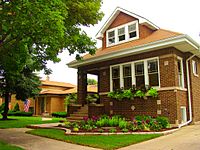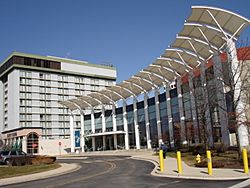Skokie, Illinois facts for kids
Quick facts for kids
Skokie, Illinois
|
|
|---|---|
|
Village
|
|
| Village of Skokie | |
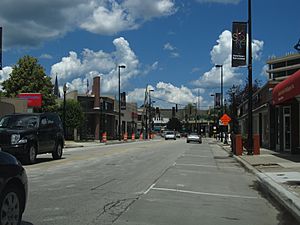
Downtown Skokie in 2013
|
|
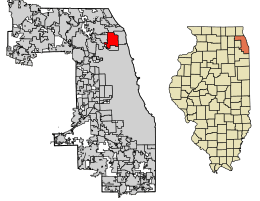
Location of Skokie in Cook County, Illinois
|
|
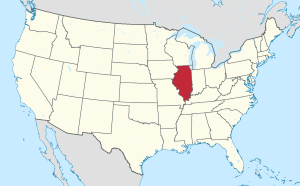
Location of Illinois in the United States
|
|
| Country | |
| State | Illinois |
| County | Cook |
| Township | Niles |
| Incorporated | 1888 |
| Government | |
| • Type | Council–manager |
| Area | |
| • Total | 10.06 sq mi (26.07 km2) |
| • Land | 10.06 sq mi (26.07 km2) |
| • Water | 0.00 sq mi (0.00 km2) 0% |
| Population
(2020)
|
|
| • Total | 67,824 |
| • Density | 6,739.27/sq mi (2,602.03/km2) |
| Up 2.27% from 2000 | |
| Standard of living (2011) | |
| • Per capita income | $32,169 |
| • Median home value | $297,900 |
| ZIP code(s) |
60076, 60077, 60203
|
| Area code(s) | 847 & 224 |
| Geocode | 70122 |
| FIPS code | 17-70122 |
Skokie ( formerly Niles Center) is a village in Cook County, Illinois, United States, neighboring the City of Chicago's northern border. Its population, according to the 2020 census, was 67,824. Skokie lies approximately 15 miles (24 km) north of Chicago's downtown Loop. Its name comes from a Potawatomi word for "marsh." For many years, Skokie promoted itself as "The World's Largest Village." Skokie's streets, like that of many suburbs, are largely a continuation of the Chicago street grid, and the village is served by the Chicago Transit Authority, further cementing its connection to the city.
Skokie was originally a German-Luxembourger farming community, but was later settled by a sizeable Jewish population, especially after World War II. At its peak in the mid-1960s, 58% of the population was Jewish, the largest percentage of any Chicago suburb. At nearly 30%, Skokie still has a large Jewish population and over a dozen synagogues. It is home to the Illinois Holocaust Museum and Education Center, which opened in northwest Skokie in 2009.
Skokie has received national attention twice for court cases decided by the United States Supreme Court. In the mid-1970s, it was at the center of National Socialist Party of America v. Village of Skokie, in which a Nazi group, backed by the American Civil Liberties Union, invoked the First Amendment in an attempt to schedule a Nazi rally in Skokie. At the time, Skokie had a significant population of Holocaust survivors. Skokie ultimately lost that case, though the rally was never held. In 2001, although Skokie was not a direct party to the case, a decision by the village and 22 other area communities regarding land use led the court to reduce the power of the United States Environmental Protection Agency.
Contents
Geography
According to the 2010 census, Skokie has a total area of 10.06 square miles (26.06 km2), all land. The village is bordered by Evanston to the east, Chicago to the southeast and southwest, Lincolnwood to the south, Niles to the southwest, Morton Grove to the west, Glenview to the northwest, and Wilmette to the north.
The village's street circulation is a standard street-grid pattern, with major east-west thoroughfare every half-mile: Old Orchard Road, Golf Road, Church Street, Dempster Street, Main Street, Oakton Street, Howard Street, and Touhy Avenue. The major north-south thoroughfares are Skokie Boulevard, Crawford Avenue, and McCormick Boulevard; the major diagonal streets are Lincoln Avenue, Niles Center Road, East Prairie Road and Gross Point Road.
Skokie's north-south streets continue the street names and (house number) grid values of Chicago's north-south streets – with the notable exceptions of Cicero Avenue, which is renamed Skokie Boulevard in Skokie, and Chicago's Pulaski Road retains its original Chicago City name, Crawford Avenue. The east-west streets continue Evanston's street names, but with Chicago grid values, such that, Evanston's Dempster Street is 8800 north, in Skokie addresses.
History
Beginnings
In 1888, the community was incorporated as Niles Centre. About 1910, the spelling was Americanized to "Niles Center". However, the name caused postal confusion with the neighboring village of Niles. A village-renaming campaign began in the 1930s. In a referendum on November 15, 1940, residents chose the Indian name "Skokie" over the name "Devonshire".
During the real estate boom of the 1920s, large parcels were subdivided; many two- and three-flat apartment buildings were built, with the "Chicago"-style bungalow a dominant architectural specimen. Large-scale development ended as a result of the Great Crash of 1929 and consequent Great Depression. It was not until the 1940s and the 1950s, when parents of the baby boom generation moved their families out of Chicago, that Skokie's housing development began again. Consequently, the village developed commercially, an example being the Old Orchard Shopping Center, currently named Westfield Old Orchard.
During the night of November 27–28, 1934, after a gunfight in nearby Barrington that left two FBI agents dead, two accomplices of notorious 25-year-old bank-robber Baby Face Nelson (Lester Gillis) dumped his bullet-riddled body in a ditch along Niles Center Road adjoining the St. Peter Catholic Cemetery, a block north of Oakton Avenue in the town.
The first African-American family to move to Skokie arrived in 1961, and open-housing activists helped to integrate the suburb subsequently.
Name
The name of the town was changed from "Niles Center" to "Skokie" by referendum in 1940. "Skokie" had previously been used as the name for the marshland on which much of the town was built; the term "Skokie marsh" was being used by local botanists, notably Henry Chandler Cowles, as early as 1901. Maps long named the Skokie marsh as Chewab Skokie, a probable derivation from Kitchi-wap choku, a Potawatomi term meaning "great marsh".
Virgil Vogel's Indian Place Names in Illinois (Illinois State Historical Society, 1963) records the name Skokie as deriving
directly from skoutay or scoti and variant Algonquian words for fire. The reference is to the fact that marshy grasslands, such as occurred in the Skokie region, were burned by the Indians to flush out the game.
In Native Placenames of the United States (U. of Oklahoma Pr, 2004), William Bright lists Vogel's Potawatomi derivation first, but adds reference to the Ojibwa term miishkooki ("marsh") recorded in the Eastern Ojibwa-Chippewa-Ottawa Dictionary (Mouton, 1985), by Richard A. Rhodes.
The 1940 change of name may also have been influenced by James Foster Porter, a Chicago native, who had explored the "Skoki Valley" in Banff National Park in Canada in 1911 and became captivated by the name. Porter supported the name "Skokie" in the referendum when he returned to America.
Supreme Court rulings
Twice in its history, Skokie has been the focal point of cases before the United States Supreme Court. National Socialist Party of America v. Village of Skokie, 432 U.S. 43 (1977), involved a First Amendment issue. Solid Waste Agency of Northern Cook County (SWANCC) v. U.S. Army Corps of Engineers, 531 U.S. 159 (2001) touched upon the Commerce Clause.
Migratory bird rule
In 2001, Skokie's decision to use an isolated wetland as a solid waste disposal site resulted in a lawsuit. Ultimately, the case went all the way to the United States Supreme Court, and resulted in an overturn of the federal migratory bird rule. See Solid Waste Agency of Northern Cook Cty. v. Army Corps of Engineers for more information.
Parks, recreation and attractions

The Skokie Park District maintains public spaces and historical sites within its more than 240 acres (0.97 km2) of parkland and in its ten facilities. The district is a recent winner of the national "Gold Medal for Excellence" in parks and recreation management. Every May since 1991, the park district hosts the Skokie Festival of Cultures to celebrate the village's diverse ethnic composition.
Westfield Old Orchard, an upscale shopping center, is one of the country's first and is the third largest mall by total square footage in Illinois. One of two in the Chicago area of the popular burger chain "Shake Shack" is located there.
Skokie has a sculpture garden that is situated between Dempster Street and Touhy Avenue on the east side of McCormick Boulevard. It was started in 1988 and now has over 70 sculptures. Three areas are toured in May through October of each year, on the last Sunday of the month with a presentation by a docent. Just north of the sculpture garden is a statue to Mahatma Gandhi with five of his famous quotations engraved around the base. This was dedicated on October 2, 2004.
In addition to municipally-managed public spaces, the village is also home to the North Shore Center for the Performing Arts, encompassing Centre East, Northlight Theatre and the Skokie Valley Symphony Orchestra. The facility celebrated its 10th anniversary in 2006.
The Illinois Holocaust Museum and Education Center opened in Skokie on April 19, 2009.
Library
On October 7, 2008, the Skokie Public Library received the 2008 National Medal for Museum and Library Service from First Lady Laura Bush in a ceremony at the White House. The National Medal is awarded annually by the federal Institute of Museum and Library Services, the primary source of federal support for the nation's 122,000 libraries and 17,500 museums, to five libraries and five museums. The library's cultural programming and multilingual services were cited in the award presentation. Skokie Public Library is the first public library in Illinois to be awarded the medal.
Additionally, the Skokie Library also offers a bookmobile service that provides a mini-library around the community.
Demographics
| Historical population | |||
|---|---|---|---|
| Census | Pop. | %± | |
| 1900 | 529 | — | |
| 1910 | 568 | 7.4% | |
| 1920 | 763 | 34.3% | |
| 1930 | 5,007 | 556.2% | |
| 1940 | 7,172 | 43.2% | |
| 1950 | 14,832 | 106.8% | |
| 1960 | 59,364 | 300.2% | |
| 1970 | 68,322 | 15.1% | |
| 1980 | 60,278 | −11.8% | |
| 1990 | 59,432 | −1.4% | |
| 2000 | 63,348 | 6.6% | |
| 2010 | 64,784 | 2.3% | |
| 2020 | 67,824 | 4.7% | |
| U.S. Decennial Census 2010 2020 |
|||
2020 census
| Race / Ethnicity | Pop 2010 | Pop 2020 | % 2010 | % 2020 |
|---|---|---|---|---|
| White alone (NH) | 35,955 | 33,697 | 55.50% | 49.68% |
| Black or African American alone (NH) | 4,566 | 5,256 | 7.05% | 7.75% |
| Native American or Alaska Native alone (NH) | 70 | 56 | 0.11% | 0.08% |
| Asian alone (NH) | 16,437 | 18,726 | 25.37% | 27.61% |
| Pacific Islander alone (NH) | 13 | 23 | 0.02% | 0.03% |
| Some Other Race alone (NH) | 185 | 424 | 0.29% | 0.63% |
| Mixed Race/Multi-Racial (NH) | 1,830 | 2,457 | 2.82% | 3.62% |
| Hispanic or Latino (any race) | 5,728 | 7,185 | 8.84% | 10.59% |
| Total | 64,784 | 67,824 | 100.00% | 100.00% |
Note: the US Census treats Hispanic/Latino as an ethnic category. This table excludes Latinos from the racial categories and assigns them to a separate category. Hispanics/Latinos can be of any race.
Public transportation
The Chicago "L"s Yellow Line terminates at the Dempster Street station in Skokie. Construction has been completed on a new Yellow Line train station at Oakton Street, to serve downtown Skokie and environs. It opened April 30, 2012. Additionally, the CTA is commissioning an Alternative Analysis Study on the extension of the Yellow Line terminal to Old Orchard Road for Federal Transit Administration New Start grants. The New Starts program allows federal funds to be used for capital projects provided all solutions for a given problem (i.e., enabling easy transportation for reverse commuters to Old Orchard Mall) is considered. The solution recommended by the CTA is the elevation of the Yellow Line north of Searle Parkway to a rebuilt Dempster Street station, then following abandoned Union Pacific Railroad tracks and the east side of the Edens Expressway to a new terminal south of Old Orchard Road. Currently this solution needs to undergo public commenting as well as FTA and CTA board approval to continue.
Although the Yellow Line is the fastest transportation to and from the city, the village also is served by CTA and Pace bus routes. However, Greyhound Bus service to the Dempster Street train station has been discontinued. For automobile transport, Interstate 94, the Edens Expressway, traverses western Skokie, with interchanges at Touhy Avenue, Dempster Street, and Old Orchard Road.
Cultural connections
Literature connections
- In K. A. Applegate's Everworld fantasy series, one of the main characters (Jalil) works in the Boston Market store in Skokie.
- In Pete Hautman's Mr. Was non-fiction novel, Jack Lund's family is from Skokie, Illinois
Film connections
- In The Usual Suspects, Roger "Verbal" Kint claims to have been a member of a barbershop quartet in Skokie.
- In That '70s Show, in episode 5 of season 7, Hyde gets a statistics job and exclaims that he's frustrated that the sales numbers for a store in Skokie "Don't add up".
Notable people
- Rob Ambrose, current head coach of Towson Tigers football team of Towson University
- Louie Belpedio, NHL player for the Minnesota Wild
- Mike Byster, mathematician, mental calculator and math educator
- Jovita Carranza (born 1949), 26th Administrator of the Small Business Administration (2020–present). She is a past resident of Skokie.
- Bobby Ciraldo, filmmaker and web-based artist
- Bart Conner, Olympic gymnast, 1984 gold medalist
- David Cromer, theatre director and stage actor
- Robert Feder, media blogger, former columnist for Chicago Sun-Times
- Brenda A. Ferber, author of children's literature
- Ken Goldstein, singer and author
- Woody Goss, musician
- Nancy Lee Grahn, actress
- Phil Handler (1908–1968), NFL football player and coach
- Erin Heatherton, fashion model and actress
- Amanda Jones, 1973 Miss USA
- Shelly Kagan, philosopher
- David Kaplan, columnist, radio and television personality
- Jonathan Kite, actor and comedian
- George Kotsiopoulos, magazine editor, fashion consultant, TV personality
- Ken Kramer, former Congressman
- Lou Lang, politician
- Rashard Mendenhall, former running back in the National Football League
- Abdel Nader, professional basketball player for the Oklahoma City Thunder of the National Basketball Association
- Emily Naphtal, figure skater
- Brent Novoselsky, NFL tight end
- Noam Pikelny, banjo player, known for association with string quintet Punch Brothers
- Menachem Posner, Skokie native and now staff editor at Chabad.org
- Esther Povitsky, standup comedian, actress and podcast host
- Matt Reichel, politician
- Eric Rosen, chess player and Twitch streamer
- Clarke Rosenberg (born 1993), American-Israeli basketball player in the Israel Basketball Premier League
- Jessy Schram, actress
- John Gideon Searle, businessman
- Randy Suess, co-founder of CBBS, the first Bulletin Board System (BBS) ever brought online.
- Calvin Sutker, politician and lawyer
- Azhar Usman, Indian-American Muslim standup comedian, actor, writer, and producer, *Asif Javed
Economy
The village's AAA bond rating attests to strong economic health via prudent fiscal management. In 2003, Skokie became the first municipality in the United States to achieve nationally accredited police, fire, and public works departments, and a Class-1 fire department, per the Insurance Services Office (ISO) ratings. Likewise, in 2003 Money magazine named Skokie one of the 80 fastest-growing suburbs in the U.S.
Besides strong manufacturing and retail commerce bases, Skokie's economy will add health sciences jobs; in 2003, Forest City Enterprises announced their re-development of the vacant Pfizer research laboratories, in downtown Skokie, as the Illinois Science + Technology Park, a 23-acre (93,000 m2) campus of research installations—2 million square feet (190,000 m2) of chemistry, genomics, toxicology laboratories, clean rooms, NMR suites, conference rooms, etc.). In 2006, NorthShore University HealthSystem announced installing their consolidated data center operations at the park, adding 500 jobs to the economy. Map maker Rand McNally is also headquartered in Skokie.
Top employers
According to the Village's 2018 Comprehensive Annual Financial Report, the top employers in the village are:
| # | Employer | # of Employees |
|---|---|---|
| 1 | NorthShore University HealthSystem | 2,410 |
| 2 | Federal-Mogul | 1,279 |
| 3 | Niles Township High School District 219 | 950 |
| 4 | Macy's | 910 |
| 5 | Georgia Nut Company | 815 |
| 6 | Nordstrom | 618 |
| 7 | Village of Skokie | 498 |
| 8 | Illinois Circuit Court of Cook County | 465 |
| 9 | Skokie Park District | 432 |
| 10 | Generation Brands | 417 |
Images for kids
-
The Illinois Holocaust Museum and Education Center in Skokie
See also
 In Spanish: Skokie para niños
In Spanish: Skokie para niños


